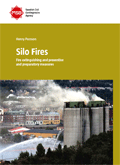Difference between revisions of "Template:Did you know"
Jump to navigation
Jump to search
m |
|||
| Line 1: | Line 1: | ||
<div id="mf-home" title="Did you know"> | <div id="mf-home" title="Did you know"> | ||
[[File:fire extinguishing and preventive and preparatory measures.gif|left| | [[File:fire extinguishing and preventive and preparatory measures.gif|left|120px]] You can download [https://www.msb.se/RibData/Filer/pdf/27144.pdf this] Swedish eBook about silo fires for free! Silo Fires highlights an operational tactic that is primarily based on the use of nitrogen gas for inerting the silo. | ||
A silo fire entails many dangers, including the risk of gas and dust explosions, which can both lead to serious injury to personnel and a risk of the fire spreading into the associated conveyor systems which can rapidly lead to extensive damage. The use of nitrogen gas is the methodology that is considered to minimize the risks of personal injury and property damage. | A silo fire entails many dangers, including the risk of gas and dust explosions, which can both lead to serious injury to personnel and a risk of the fire spreading into the associated conveyor systems which can rapidly lead to extensive damage. The use of nitrogen gas is the methodology that is considered to minimize the risks of personal injury and property damage. | ||
Latest revision as of 00:42, 7 April 2014
You can download this Swedish eBook about silo fires for free! Silo Fires highlights an operational tactic that is primarily based on the use of nitrogen gas for inerting the silo.
A silo fire entails many dangers, including the risk of gas and dust explosions, which can both lead to serious injury to personnel and a risk of the fire spreading into the associated conveyor systems which can rapidly lead to extensive damage. The use of nitrogen gas is the methodology that is considered to minimize the risks of personal injury and property damage.
